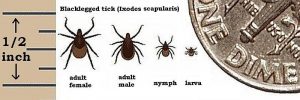 In the spring, there is an increased chance of being bitten by a seed tick. Seed ticks pose additional dangers and it is important to be aware of these dangers so that you can take the steps necessary to protect yourself from these ticks. All types of ticks will go through the phase of being a seed tick. Learn the answers to common questions about seed ticks.
In the spring, there is an increased chance of being bitten by a seed tick. Seed ticks pose additional dangers and it is important to be aware of these dangers so that you can take the steps necessary to protect yourself from these ticks. All types of ticks will go through the phase of being a seed tick. Learn the answers to common questions about seed ticks.
What Are Seed Ticks?
Seed ticks are actually tick larvae. They look similar to adult ticks, but they are much smaller than adult ticks. They are still larvae, and they need at least one blood meal so that they can move onto the next stage in their lifecycle. This is the stage after the ticks hatch from their eggs.
What Do Seed Ticks Look Like?
Seed ticks look similar to their adult counterparts. They are much smaller than adult ticks. They can easily be mistaken for a new mole or freckle. Instead of having eight legs like adult ticks, they only have six legs. The seed tick coloring is dependent on the type of tick that it is. Often someone bitten by one seed tick will have multiple ticks on them.
Do Seed Ticks Spread Disease?
Seed ticks can spread a number of tick-borne illnesses. One of these is Lyme’s disease. They can also spread Rocky Mountain spotted fever and other illnesses that will need to be treated with antibiotics in order for you to recover from them. After mosquitoes, ticks spread the most diseases to people out of all the other insects.
What Time of Year Do Seed Ticks Appear?
Seed ticks are the larva of the ticks, so they will appear when the eggs hatch in the spring. Seed ticks will usually feed on a small animal initially like a rodent and then wait for you to pass by to attach to you or another host. If you are going into a tick heavy area in the spring, you need to take extra steps to protect yourself from ticks.
How Do I Prevent Seed Ticks?
There are a few things you can do to protect yourself from seed ticks. If you are going to a tick prone area, you should apply insect repellent. DEET is one of the most effective options available on the market. Be sure to wear long pants and long sleeves when you are spending time outdoors and to tuck your pants into your socks and your shirt into your pants. Avoiding walking through fields with long grasses or in areas where you will brush up against plants. This is how ticks get on you.
Once you leave the area, you should check your clothing and yourself for ticks. Ticks may spend a significant amount of time on you before they attach. Change out of your clothing and shower as soon as possible to stop any from attaching to you and to prevent them from getting in your home. As an added protection, you may want to treat your yard to prevent ticks. This will kill the seed ticks too. This will be beneficial if you live in area that is prone to ticks.
Check for ticks carefully. Seed ticks are smaller, about the size of a poppy seed. You will need to look closely to see if you have any. If you do find one, look for additional ticks. These can be harder to remove because of their small size it can be difficult to use tweezers to grab them. However, this is the best method for removing them. Be sure that you remove the entire tick.
Comments
Post a Comment